- Home
- Gerald Durrell
The Picnic and Suchlike Pandemonium Page 2
The Picnic and Suchlike Pandemonium Read online
Page 2
He paid off the taxi, and walked into the house ahead of us, carrying his suitcase. He was wearing a deer-stalker hat in a dog-tooth tweed, and a suit in a singularly unattractive tartan, the ground colour of which was dog-sick green with a dull red stripe over it. He looked like a diminutive and portly Sherlock Holmes.
‘Mercifully, we are cold-free,’ said Mother, following him into the house. ‘It’s this lovely fine weather we’ve been having. Would you like some tea, dear?’
‘I’d rather have a large whisky and soda,’ said Larry, taking a half empty bottle out of the capacious pocket of his coat. ‘It’s better for colds.’
‘But you said you hadn’t got a cold,’ pointed out Mother.
‘I haven’t,’ replied Larry, pouring himself out a large drink. ‘This is in case I get one. It’s what is called preventive medicine.’
It was obvious that he had been using preventive medicine on the way down, for he grew more and more convivial as the evening drew on; so much so that Mother felt she could broach the subject of the picnic.
‘We thought’ she said, ‘since the Air Ministry’s roof is emphatic about the terribly hot weather, that we might take the Rolls out and go for a picnic tomorrow.’
‘Don’t you think that’s a bit churlish, going off and leaving me after a ten-year exile?’ asked Larry.
‘Don’t be silly, dear,’ said Mother. ‘You come too.’
‘Not a picnic in England,’ protested Larry, brokenly. ‘I don’t think I’m up to it. How I remember it from my youth! All the thrill of ants and sand in the food, trying to light a fire with damp wood, the howling gales, the light snowfall, just as you’re munching your first cucumber sandwich . . .’
‘No, no, dear. The Air Ministry roof says we’re having an unprecedented ridge of high pressure,’ said Mother. ‘Tomorrow’s going to be very hot, it said.’
‘It may be hot on the Air Ministry roof, but is it going to be hot down here?’ enquired Larry.
‘Of course,’ insisted Mother stoutly.
‘Well, I’ll think about it,’ promised Larry as, carrying the remains of the whisky in case germs attacked him in the night, he made his way to bed.
Next morning dawned blue and breathless, the sun already warm at seven o’clock. Everything augured well. Mother, in order to leave no stone unturned in her efforts to keep Larry in a good mood, gave him his breakfast in bed. Even Margo, in the interests of peace, refrained from giving us our normal excruciating half-hour when she sang the latest pop tunes in the bath, without the benefit of knowing either the tune or the lyric with any degree of certainty.
By ten o’clock, the Rolls had been loaded up and we were preparing to go. Jack made some last-minute slight but important adjustment to the engine, Mother counted the food packages for the last time, and Margo had to go back into the house three times to get various items that she had forgotten. At last we were ready and assembled on the pavement.
‘Don’t you think we ought to have the roof down, since it’s such a nice day?’ suggested Jack.
‘Oh, yes, dear,’ said Mother. ‘Let’s take advantage of the weather while we’ve got it.’
Between them Leslie and Jack lowered the canvas roof of the Rolls. We entered the car, and were soon bowling along through the English countryside, as lush and as green and as miniature as you could wish for, full of birdsong. Even pieces of woodland on the rolling Purbeck hills were set in bas-relief against the blue sky in which, high and faint, like the ghosts of minnows, a few threads of cloud hung immobile. The air was fragrant, the sun was warm and the car, purring softly as a sleepy bumblebee, slid smoothly between tall hedges, breasted green hills, and swept like a hawk down into valleys where the cottages clustered under their thatched roofs so that each village looked as though it was in need of a haircut.
‘Yes,’ commented Larry, musingly, ‘I’d forgotten how Victorian dolls’ house the English landscape could look.’
‘Isn’t it lovely, dear?’ said Mother. ‘I knew you’d like it.’
We had just swept through a hamlet of whitewashed cottages, each with a thatch that looked like an out-sized pie-crust on top, when Jack suddenly stiffened behind the wheel.
‘There!’ he barked suddenly. ‘Didn’t you hear it? Distinctly. Tickety-tickety-ping, and then a sort of scroobling noise.’
There was a pause.
‘I would have thought,’ Larry observed to Mother, ‘that this family was quite unbalanced enough without adding insanity by marriage.’
‘There it goes again. The scrooble! The scrooble! Can’t you hear it?’ cried Jack, his eyes gleaming fanatically.
‘Oh, God!’ said Margo bitterly. ‘Why is it we can’t go anywhere without you wanting to take the car to pieces?’
‘But it might be serious,’ said Jack. ‘That tickety-tickety-ping might be a cracked magneto head.’
‘I think it was just a stone you kicked up,’ said Leslie.
‘No, no,’ said Jack. ‘That’s quite a different ping. That’s just a ping without the tickety.’
‘Well, I didn’t hear any tickety’ said Leslie.
‘Nobody ever hears his tickety except him,’ complained Margo, angrily. ‘It makes me sick!’
‘Now, now, dear – don’t quarrel,’ said Mother, peaceably. ‘After all, Jack is the engineer of the family.’
‘If he’s an engineer, it’s a curious sort of technical language they are teaching them now,’ commented Larry. ‘Engineers in my day never discussed their tickety-pings in public.’
‘If you think it’s serious, Jack,’ said Mother, ‘we’d better stop and let you have a look at it.’
So Jack pulled into a lay-by, flanked with willows in bloom, leapt out of the car, opened the bonnet, and flung himself into the bowels of Esmerelda, as a man dying of thirst would throw himself into a desert pool. There were a few loud groans and some grunts, and then a high nasal humming noise that sounded like an infuriated wasp caught in a zither. It was our brother-in-law humming.
‘Well,’ said Larry ‘since it seems that our postillion has been struck by lightning, how about a life-giving drink?’
‘Isn’t it a bit early, dear?’ asked Mother.
‘It may be too early for the English,’ observed Larry, ‘but don’t forget that I’ve been living among a lot of loose-moraled foreigners who don’t think that there’s one special time for pleasure, and who don’t feel that you’re putting your immortal soul in danger every time you have a drink, day or night.’
‘Very well, dear,’ said Mother. ‘Perhaps a small drink would be nice.’
Leslie broached the boot and passed us out the drinks.
‘If we had to stop, this is quite a pleasant spot,’ said Larry, condescendingly gazing round at the rolling green hills, chess-boarded by tall hedges, and patterned here and there with the black and frothy green of woodland.
‘And the sun really is remarkably hot,’ put in Mother. ‘It’s quite extraordinary for the time of year.’
‘We shall pay for it in winter, I suppose,’ said Leslie, gloomily. ‘We always seem to.’
Just at that moment, from beneath the bonnet of the car, came a loud reverberating sneeze. Larry froze, his glass halfway to his mouth.
‘What was that?’ he asked.
‘Jack,’ answered Leslie.
‘That noise?’ exclaimed Larry. ‘That was Jack?’
‘Yes,’ said Leslie. ‘Jack sneezing.’
‘Dear God!’ cried Larry. ‘He’s brought a bloody germ with him. Mother, I’ve spent a week avoiding infection by every means known to the British Medical Association, only to be transported out here into the wilderness without a medical practitioner within fifty miles, to be bombarded by cold germs by my own brother-in-law. It really is too much!’
‘Now, now, dear,’ s
aid Mother soothingly. ‘People sneeze without having colds, you know.’
‘Not in England,’ said Larry. ‘The sneeze in England is the harbinger of misery, even death. I sometimes think the only pleasure an Englishman has is in passing on his cold germs.’
‘Larry, dear, you do exaggerate,’ said Mother. ‘Jack only sneezed once.’
Jack sneezed again.
‘There you are!’ said Larry, excitedly ‘That’s the second time. I tell you, he’s working up for an epidemic. Why don’t we leave him here; he can easily hitch a lift back into Bournemouth, and Leslie can drive.’
‘You can’t just leave him on the roadside, Larry, don’t be silly,’ said Mother.
‘Why not?’ asked Larry. ‘The Eskimos put their old people out on ice-floes to be eaten by polar bears.’
‘I don’t see why Jack has to be eaten by a polar bear just because you’re frightened of a stupid little cold,’ exclaimed Margo, indignantly.
‘I was speaking figuratively,’ said Larry. ‘In this area, he’d probably be pecked to death by cuckoos.’
‘Well, I’m not having him left, anyway,’ said Margo.
At that moment, Jack emerged from under the bonnet of the car. His ample nose seemed to have grown to twice its normal size, and to have assumed the colouring of an over-ripe persimmon. His eyes were half closed and watering copiously. He approached the car, sneezing violently.
‘Go away!’ shouted Larry. ‘Take your filthy germs into the fields!’
‘Id’s nod germs,’ said Jack, endeavouring to enunciate with clarity. ‘Id’s by hay feber.’
‘I don’t want to know the scientific name for it – just take it away!’ shouted Larry. ‘Who the hell do you think I am? Louis Pasteur? Bringing your bloody germs to me.’
‘Id’s hay feber,’ Jack repeated, sneezing violently. ‘Dere must be some damn flower or udder growing here.’ He glanced about balefully through streaming eyes and spotted the willows. ‘Ah!’ he snarled, through a flurry of sneezes, ‘dad’s id, der bloody things.’
‘I can’t understand a word he’s saying,’ said Larry. ‘This cold’s unhinged what passed for his mind.’
‘It’s his hay fever,’ explained Margo. ‘The willows have started it up.’
‘But that’s worse than a cold,’ said Larry in alarm. ‘I don’t want to catch hay fever.’
‘You can’t catch it, dear,’ said Mother. ‘It’s an allergy.’
‘I don’t care if it’s an anagram,’ said Larry. ‘I’m not having it breathed all over me.’
‘But it’s not infectious,’ insisted Margo.
‘Are you sure?’ asked Larry. ‘There’s always a first time. I expect the first leper said that to his wife, and before she knew what was happening, she’d founded a colony, all ringing their bells and shouting “unclean”.’
‘You do complicate things, dear,’ said Mother. ‘It’s perfectly ordinary hay fever.’
‘We muzt ged away from deze trees,’ said Jack. He entered the car and drove us off at such a furious pace that we just missed hitting a large wagon of manure pulled by two giant Shire horses, which was coming round the corner.
‘I don’t remember entering into any suicide pact with him,’ cried Larry, clinging to the door.
‘Not so fast,’ said Margo. ‘You’re going too fast.’
‘Air!’ groaned Jack. ‘God to have air to ged rid of de pollen.’
After a few miles of furious driving, accompanied by squeaks of alarm from Mother and Margo and admonitory roars from Larry, Jack had taken sufficient air through his nose to ease his affliction somewhat. We settled down to a more sedate pace.
‘I should never have set foot in England again. I knew it,’ complained Larry. ‘First it’s cold germs, then it’s hay fever, then a death-defying ride like something out of Ben Hur. When you get to my age, you can’t stand this sort of pace without getting a coronary.’
Just before lunchtime, we discovered that we were enmeshed in the maze of little lanes that led all over the headlands and the cliffs. In our efforts to try to find Lulworth Cove, we got ourselves thoroughly lost, but at last we followed a road that led down to a circular bay guarded by tall cliffs. The bay looked blue and serene in the sunshine, so we decided to stop and have lunch there. Apart from an elderly couple exercising their dog, the beach was deserted.
‘How fortunate,’ said Mother. ‘We’ve got the beach to ourselves. I was afraid this fine weather might bring out a lot of people.’
‘Let’s walk half-way round the bay,’ suggested Leslie. ‘It’s not very far, and you get a better view.’
Having all agreed to this plan, we parked the Rolls and, staggering under the burden of food and drink and rugs to sit on, made our way across the shingle.
‘I must have something to sit against,’ said Mother. ‘Otherwise I get terrible backache.’
‘Yes, you must recline in a civilized manner,’ agreed Larry, ‘otherwise you’ll get your viscera in a knot. It leads to ulcers and all sorts of things. Your guts rot and your food falls through into the stomach cavity.’
‘Larry, dear, not just before we eat,’ said Mother.
‘How about leaning against the cliff?’ suggested Margo.
‘That’s a brainwave,’ said Mother. ‘Over there, in that sort of little sheltered nook.’
As she started across the shingle towards it, a fairly large chunk of the cliff came away and fell to the beach with a crash, to be followed by a hissing waterfall of sand.
‘Thank you,’ said Larry. ‘If you sit there, you sit alone. I have no desire to be buried alive.’
‘Look, there’s a big, black rock in the middle of the beach,’ said Leslie, ‘perfect for leaning against.’
He hurried ahead and reached the rock. He threw down the things he was carrying draped the rock with the rug padded it with cushions, and had a suitable seat for Mother to sink on to when she had staggered across the shingle to his side. Larry sat down beside her, and the rest of us spread more rugs and sat down, unpacking the vast array of food.
‘There’s a very curious smell around here,’ Larry complained, his mouth full of curry-puff.
‘It’s the seaweed,’ explained Leslie. ‘It always pongs a bit.’
‘It’s supposed to be very healthy for you,’ said Margo. ‘Anywhere that smells of seaweed is supposed to be good for the lungs.’
‘I wouldn’t have thought that this smell was good for the lungs,’ complained Mother. ‘It’s a bit . . . well, it’s a bit . . . strong.’
‘It comes in waves; said Larry. ‘I suppose the wind is carrying it.’
‘Oh, yes, I can smell it,’ said Margo, closing her eyes and inhaling deeply ‘You can almost feel it doing your lungs good.’
‘Well, it’s not doing my lungs any good,’ exclaimed Larry.
‘The wind will probably change in a minute and blow it the other way,’ put in Leslie cheerfully, cutting himself a large piece of game pie.
‘I do hope so. It’s a bit over-powering,’ said Mother.
We ate for some time in silence, and then Larry sniffed. ‘It seems to be getting stronger,’ he observed.
‘No, it’s just the way the wind blows it,’ answered Leslie. Larry got to his feet and peered about.
‘I don’t see any seaweed; he said, ‘except right over there at the water’s edge.’
He came over to where we were sitting and sniffed again.
‘Well, no wonder you’re not complaining,’ he commented bitterly, ‘there’s hardly any smell over here. It seems to be concentrated where Mother and I are sitting’.
He went back to where Mother was sipping her wine and enjoying a Cornish pasty, and prowled around. Suddenly he let out such a cry of anguish and rage that everybody jumped, and Mother dropped her gla
ss of wine into her lap.
‘Great God Almighty, look!’ roared Larry. ‘Just look where that bloody fool Leslie’s put us! No wonder we’re being stunk out; we’ll probably die of typhoid!’
‘Larry, dear, I do wish you wouldn’t shout like that,’ complained Mother, mopping up the wine in her lap with her handkerchief. ‘It’s quite possible to say things in a calm way.’
‘No, it isn’t!’ said Larry, violently. ‘No one can keep calm in the face of this . . . this olfactory outrage!’
‘What outrage, dear?’ asked Mother.
‘Do you know what you’re leaning against?’ he asked. ‘Do you know what that back-rest is, that was chosen for you by your son?’
‘What?’ replied Mother, glancing nervously over her shoulder. ‘It’s a rock, dear.’
‘It’s not a rock,’ said Larry, with dangerous calm, ‘nor is it a pile of sand, a boulder, or a fossilized dinosaur’s pelvis. It is nothing remotely geological. Do you know what you and I have been leaning against the last half hour?’
‘What, dear?’ asked Mother, now considerably alarmed.
‘A horse,’ replied Larry. ‘The mortal remains of a ruddy great horse!.’
‘Rubbish.’’ said Leslie, incredulously. ‘It’s a rock.’
‘Do rocks have teeth?’ enquired Larry, sarcastically. ‘Do they have eye sockets? Do they have the remains of ears and manes? I tell you – owing either to your malevolence or stupidity, your mother and I will probably be stricken with some fatal disease.’
Leslie got up and went to have a look, and I joined him. Sure enough, from one end of the rug protruded a head, which undeniably had once belonged to a horse. All the fur had fallen off and the skin, through a motion in the sea water, had become dark brown and leathery. The fish and gulls had emptied the eye sockets, and the skin of the lips was drawn back in a snarl displaying the tomb-stone-like teeth, a discoloured yellow.
‘How damned odd,’ said Leslie. ‘I could have sworn it was a rock.’
‘It would save us all a considerable amount of trouble if you invested in some glasses,’ remarked Larry with asperity.

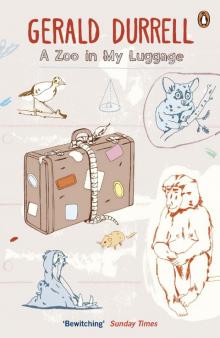 A Zoo in My Luggage
A Zoo in My Luggage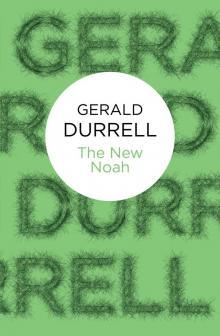 The New Noah
The New Noah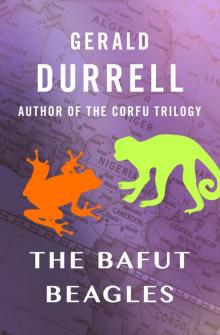 The Bafut Beagles
The Bafut Beagles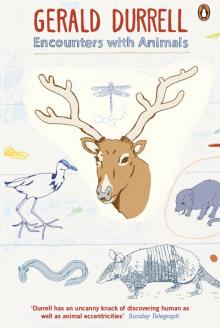 Encounters With Animals
Encounters With Animals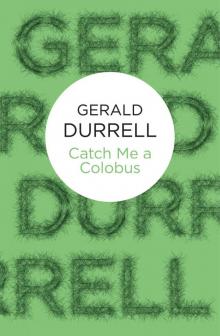 Catch Me a Colobus
Catch Me a Colobus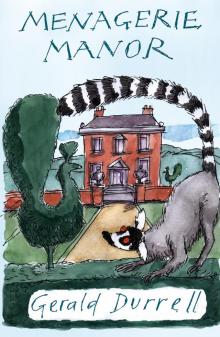 Menagerie Manor
Menagerie Manor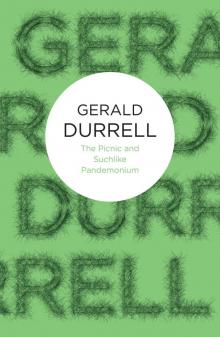 The Picnic and Suchlike Pandemonium
The Picnic and Suchlike Pandemonium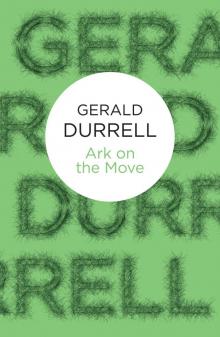 Ark on the Move
Ark on the Move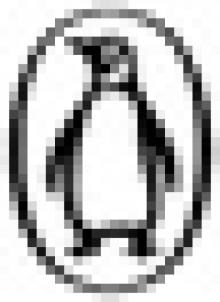 My Family and Other Animals
My Family and Other Animals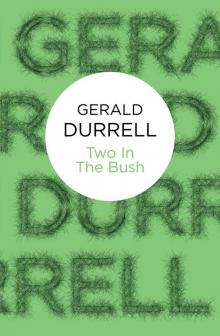 Two in the Bush (Bello)
Two in the Bush (Bello)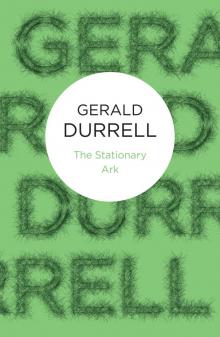 The Stationary Ark
The Stationary Ark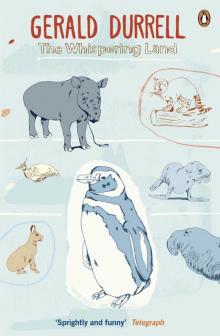 The Whispering Land
The Whispering Land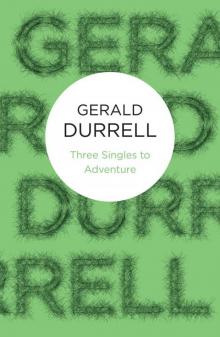 Three Singles to Adventure
Three Singles to Adventure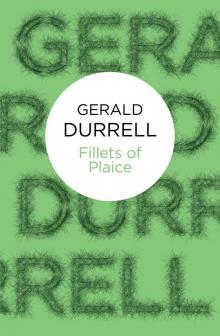 Fillets of Plaice
Fillets of Plaice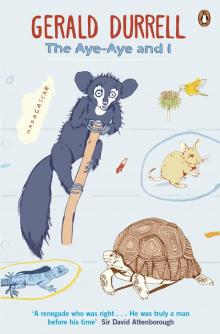 The Aye-Aye and I
The Aye-Aye and I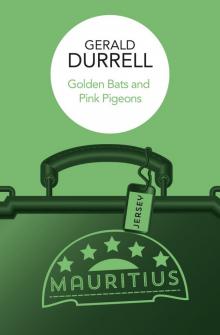 Golden Bats & Pink Pigeons
Golden Bats & Pink Pigeons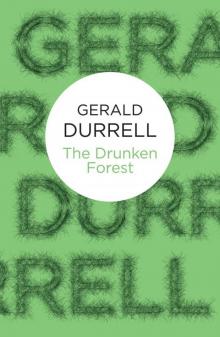 The Drunken Forest
The Drunken Forest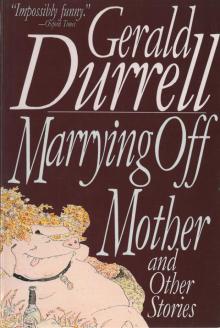 Marrying Off Mother: And Other Stories
Marrying Off Mother: And Other Stories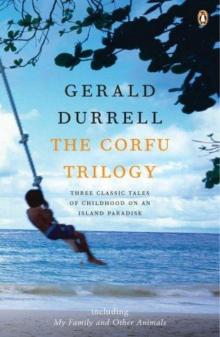 The Corfu Trilogy (the corfu trilogy)
The Corfu Trilogy (the corfu trilogy)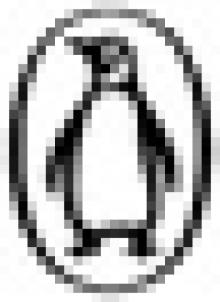 The Corfu Trilogy
The Corfu Trilogy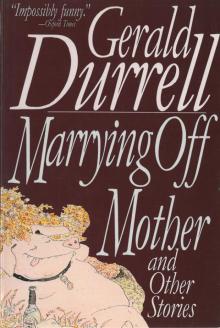 Marrying Off Mother
Marrying Off Mother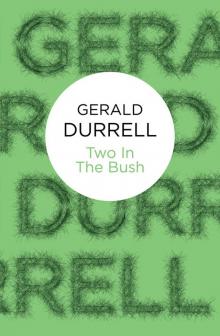 Two in the Bush
Two in the Bush